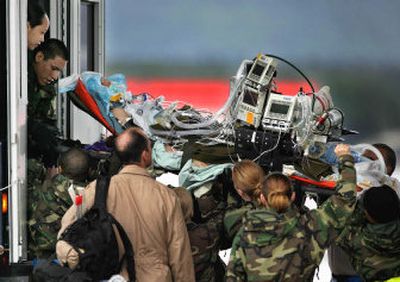1,500 more troops to join Iraq fight

BAGHDAD, Iraq – The Pentagon’s hopes to make substantial reductions in U.S. troop levels in Iraq this year appear to be fading as a result of resurgent violence in the country, particularly in the Sunni Arab stronghold of Anbar Province, military officials acknowledge.
U.S. Army Gen. George W. Casey, commander of coalition forces in Iraq, announced Tuesday that he was moving 1,500 reserve troops that had been held in Kuwait to Anbar, the restive western region that includes the war-torn cities of Fallujah and Ramadi.
Pentagon officials insisted publicly Tuesday that the move to temporarily bolster forces was unconnected to Casey’s pending recommendation on overall troop levels, now expected to come sometime next month following a series of delays. But other officers have privately acknowledged the worsening situation in Anbar – particularly in Ramadi, which U.S. officials acknowledge is now under insurgent control – is likely to prevent any significant drawdown this year.
Since the beginning of this year, military commanders have said that political progress and the advancing Iraqi military may allow for substantial U.S. troop reductions, from over 130,000 now to 100,000 or below. But one senior officer privy to Iraq planning discussions, who requested anonymity when talking about internal Pentagon debates, said “there’s a growing realization” that ongoing violence is hampering withdrawal plans.
Illustrating the new intensity in the violence in Iraq, a series of car bombings and other attacks killed more than 50 Iraqis and one U.S. soldier on Tuesday.
In Tuesday’s deadliest incident, at least 25 people were killed and more than 50 injured when a car bomb exploded near a bus stop in Husseiniyah, about 20 miles north of Baghdad, Maj. Gen. Hussein Kamal, a deputy interior minister, said in a televised statement.
Another car bombing, in Hilla, about 60 miles south of Baghdad, killed 12 people and wounded 32. The bomb exploded in an auto dealers’ area, police Capt. Muthanna Ahmad said.
A third bomb exploded in front of a bakery in Baghdad, killing 10 people, the al-Arabiya television network reported Tuesday night.
The attacks came a day after another string of bombings, one of which killed a U.S. soldier, two CBS News staff members and an Iraqi interpreter and wounded CBS News correspondent Kimberly Dozier and six U.S. soldiers.
Ramadi remains the area of most concern, military officials in Iraq and Washington said. Brig. Gen. Carter F. Ham, a senior planner for the Joint Chiefs of Staff, said last week that Ramadi is “probably the most contentious city right now inside Iraq”, adding there are suspicions Abu Musab al-Zarqawi’s organization may be trying to establish a “safe haven” in the city.
Signs that al-Zarqawi-linked groups have taken over the city have been growing. One by one, Sunni sheiks with ties to nationalist rebels, who earlier in the year vowed to fight radical Islamic insurgents in Anbar Province and Ramadi, have been assassinated, a sign they are losing the internecine fight.
Tribal leaders describe Ramadi as “lawless”; American troops are currently unable to stop the gunmen who threaten and kill local residents, they say. U.S. forces in the city, which are being led by a National Guard brigade, remain hunkered down in the battle-scarred downtown government center and come under large-scale attacks almost daily.
After repeated attacks on both officers and recruits, the city has no effective Iraqi police force.
Despite Ramadi’s growing emergence as an insurgent stronghold, military officials insisted the move of new troops to Anbar was a “short-term deployment,” part of an effort to “facilitate and assist” existing Iraqi forces in the area, rather than a prelude to an offensive similar to 2004’s attack on nearby Fallujah, which at the time had become a safe haven for rebels.